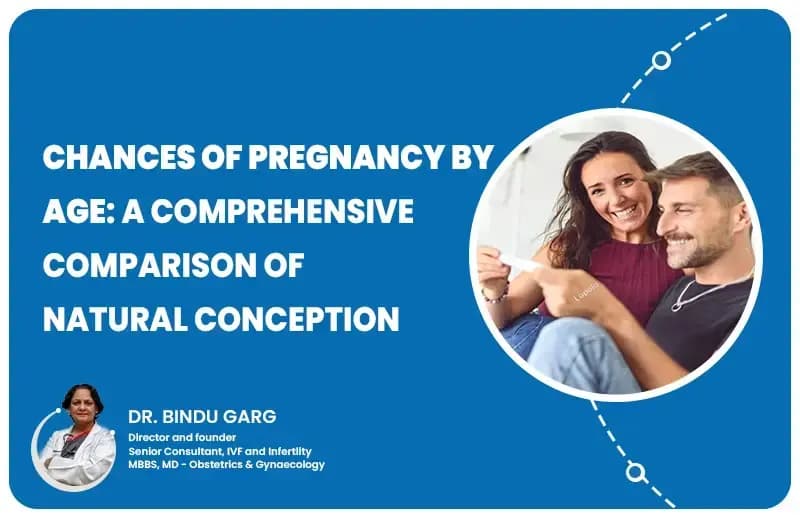
Pregnancy Chances by Age: Natural Conception vs. IUI vs. IVF
The journey to parenthood can be complex and challenging, with age being a significant factor influencing fertility. Whether you are considering natural conception, Intrauterine Insemination (IUI), or In Vitro Fertilization (IVF), understanding how age affects your chances of pregnancy is crucial. This blog will explore how age impacts fertility and compare the success rates of natural conception, IUI, and IVF.
The Impact of Age on Fertility
Natural Conception
Age has a profound effect on a woman’s fertility. Here's a closer look at how fertility changes with age:
- 20s to Early 30s:
- Fertility Peak:Women in their 20s and early 30s generally experience the highest fertility levels. The chances of conceiving naturally each month are around 20-25%.
- Egg Quality:Egg quality is typically high, and there are fewer chromosomal abnormalities.
- Mid 30s to 40s:
- Decline in Fertility:Fertility begins to decline significantly after age 35. The chances of conceiving naturally drop to about 15-20% per month.
- Egg Quality:Egg quality deteriorates, increasing the risk of chromosomal abnormalities and miscarriage.
- Over 40:
- Significant Decline:By age 40, natural conception rates are about 5% per cycle. The decline in egg quantity and quality becomes more pronounced.
- Increased Risk:There is a higher risk of complications, such as miscarriage and genetic disorders.
Male Fertility
Men's fertility also declines with age, though the effect is less pronounced compared to women. Sperm quality and quantity can decrease, affecting fertility. By age 40 and beyond, men may experience reduced sperm motility and an increased risk of genetic abnormalities.
IUI (Intrauterine Insemination)
IUI is a fertility treatment where sperm is directly inserted into the uterus around the time of ovulation. Here's how age influences IUI success rates:
- 20s to Early 30s:
- Success Rates:Women in this age group typically have the highest success rates with IUI, ranging from 15-20% per cycle. The chances of achieving a pregnancy are favorable due to better egg quality and overall fertility health.
- Mid 30s to 40s:
- Success Rates:Success rates decrease as women age. For those in their late 30s to early 40s, success rates can drop to 10-15% per cycle. The reduced quality and quantity of eggs impact the likelihood of a successful pregnancy.
- Over 40:
- Success Rates:For women over 40, IUI success rates are lower, typically around 5-10% per cycle. Despite being less effective than in younger women, IUI can still be a viable option, especially when combined with other treatments or procedures.
IVF (In Vitro Fertilization)
IVF involves retrieving eggs from the ovaries and fertilizing them with sperm in a lab, then transferring the embryos into the uterus. Here's how age affects IVF success:
- 20s to Early 30s:
- Success Rates:IVF success rates are highest in this age group, with live birth rates ranging from 40-50% per cycle. Younger women generally have better egg quality and a higher chance of embryo implantation.
- Mid 30s to 40s:
- Success Rates:IVF success rates begin to decline with age. Women in their late 30s to early 40s typically have success rates of 30-40%. Egg quality diminishes, but IVF still offers a relatively high chance of pregnancy compared to natural conception and IUI.
- Over 40:
- Success Rates:For women over 40, IVF success rates are around 20-30%. While the chances are lower compared to younger age groups, IVF remains one of the most effective methods for older women seeking pregnancy.
Comparing Natural Conception, IUI, and IVF by Age
- In Your 20s:Natural conception, IUI, and IVF all have high success rates. Natural conception is often the simplest and most cost-effective method.
- In Your 30s:While natural conception rates decline, IUI and IVF still offer good chances of success, especially if you start treatment early in the decade.
- In Your 40s:IVF becomes a more favorable option due to its higher success rates compared to natural conception and IUI. The combination of treatments and personalized care can improve outcomes.
Conclusion
Age plays a critical role in fertility, influencing the effectiveness of natural conception, IUI, and IVF. While natural conception becomes more challenging with age, fertility treatments like IUI and IVF provide valuable options. Understanding these factors can help you make informed decisions and optimize your chances of achieving a successful pregnancy.
For personalized advice and treatment options, consult with a fertility specialist to tailor a plan that best suits your age and individual circumstances.
Content Created By:

CyberBizz Technologies
Team - Content Curator